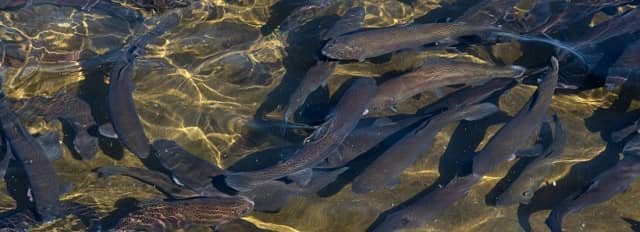
Temperature is the ‘primary ecological factor,’ shaping ecosystems and influencing organisms at their core. For fish, especially temperature-sensitive cold-water species like rainbow trout, it plays a crucial role in their well-being. As our planet grapples with climate change, understanding how temperature fluctuations affect fish physiology becomes more urgent than ever.
A recent study by researchers from Atatürk University delves into the intricate relationship between temperature variations and physiological stress responses in rainbow trout (Oncorhynchus mykiss). Using a climate change model, they examined fish blood physiology and oxidative stress levels (a measure of internal cellular damage) under different temperature regimes.
Water temperature: A key factor
Temperature is one of the most critical factors for the growth and survival of aquatic organisms. It directly affects physiological processes such as metabolic rate, immunity, oxygen demand, and feed intake. Temperatures above the thermal threshold can increase oxygen demand and suppress immunity, in addition to reducing food consumption. This is because temperature change negatively impacts aerobic metabolism and limits oxygen solubility and availability.
According to predictions by the Intergovernmental Panel on Climate Change (IPCC), water temperatures could increase by 3°C by 2100 in many parts of the world. These changes will significantly impact the aquaculture industry.
Key findings of the study
For their experiment, scientists raised rainbow trout (Oncorhynchus mykiss) at water temperatures of 12, 15, 18, and 21°C. To determine stress physiology and antioxidant status, blood, liver, and muscle tissue samples were taken from fish in each experimental tank.
The study’s findings shed light on the fascinating resilience of rainbow trout. When faced with warmer waters, the fish exhibited a remarkable ability to activate certain gene expressions, essentially developing defenses against potential tissue and blood damage. This suggests a complex internal response system, a set of hidden tools used by trout to combat challenges in a changing environment.
In summary, the key findings include:
Hematological changes:
- Decrease in hemoglobin (Hb) and red blood cell (RBC) levels at higher temperatures, possibly due to damage to the hematopoietic system under stress.
- Increase in white blood cell (WBC) content as a response to stress and antibody production.
Oxidative stress and antioxidant defense:
Stay Always Informed
Join our communities to instantly receive the most important news, reports, and analysis from the aquaculture industry.
- Increased reactive oxygen species (ROS) production due to thermal stress, leading to oxidative damage.
- Positive regulation of antioxidant enzymes superoxide dismutase (SOD), catalase (CAT), and glutathione peroxidase (GPx) to counteract ROS production and lipid peroxidation.
- Discrepancy between SOD and CAT activities at higher temperatures, suggesting potential limitations in antioxidant defense.
- Increase in malondialdehyde (MDA) levels confirming lipid oxidation and cellular damage at higher temperatures.
Tissue-specific responses:
- Liver and muscle tissues show different levels of oxidative stress and changes in enzymatic activity, highlighting tissue-specific sensitivity to temperature.
- Increased MPO activity indicating possible inflammation in response to stress.
Application in aquaculture
Research on the effects of global warming on fish physiology is crucial for developing strategies to adapt aquaculture practices and protect fish populations. By understanding the complex interaction between temperature and fish physiology, we can develop strategies to mitigate the negative impacts of climate change and ensure the sustainability of aquaculture.
However, the implications of this research extend far beyond individual fish. This study paves the way for new experimental designs and research collaborations in aquaculture. Understanding how climate change affects the physiology of commercially important fish like trout can benefit the entire food value chain. Fish farmers can adapt their practices to create more resilient fish populations, and consumers can be assured of the nutritional quality and sustainability of their seafood products.
Conclusion
The growing demand for food, coupled with the challenges of climate change, underscores the urgency of understanding the impact of environmental factors on aquaculture. By studying the physiology of fish such as rainbow trout, valuable insights into thermal stress mechanisms can be gained, leading to strategies to protect fish populations and ensure the sustainability of aquaculture.
“The results of our current research also confirm that rainbow trout is sensitive to rising water temperatures in terms of oxidative stress in blood and liver. High-temperature stress, with increased antioxidant enzyme activity, had a corresponding effect on the oxidative status of fish,” concluded the researchers.
However, the study also highlights crucial ‘knowledge gaps’ that require further research. What are the long-term impacts of these physiological changes on growth, reproduction, and fish survival? How do different species adapt to different temperature regimes? These are just some of the questions that future research needs to address.
By delving into the realm of stress physiology in aquaculture, we can bridge the gap between scientific understanding and practical solutions. This study is a significant step forward and provides valuable insights into the complex interplay between climate change and fish health. The knowledge gained paves the way for a more sustainable and resilient future for both fish and the communities that depend on them.
Contact
Gonca Alak
Department of Seafood Processing, Faculty of Fisheries
Atatürk University
Erzurum, Turkey
Email: galak@atauni.edu.tr
Reference (open access)
Alak G, Özgeriş FB, Uçar A, Parlak V, Kocaman EM, Özcan S, et al. (2023) Effect of climate change on hematotoxicity/hepatotoxicity oxidative stress, Oncorhynchus mykiss, under controlled conditions. PLoS ONE 18(11): e0294656. https://doi.org/10.1371/journal.pone.0294656
Editor at the digital magazine AquaHoy. He holds a degree in Aquaculture Biology from the National University of Santa (UNS) and a Master’s degree in Science and Innovation Management from the Polytechnic University of Valencia, with postgraduate diplomas in Business Innovation and Innovation Management. He possesses extensive experience in the aquaculture and fisheries sector, having led the Fisheries Innovation Unit of the National Program for Innovation in Fisheries and Aquaculture (PNIPA). He has served as a senior consultant in technology watch, an innovation project formulator and advisor, and a lecturer at UNS. He is a member of the Peruvian College of Biologists and was recognized by the World Aquaculture Society (WAS) in 2016 for his contribution to aquaculture.




